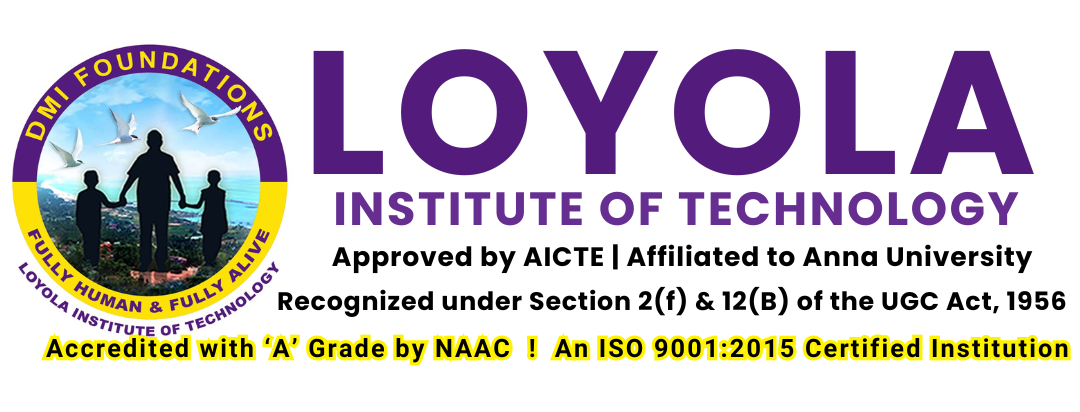B.E - Electronics and Communication Engineering
About The Department
The Department of Electronics and Communication Engineering was established in the year 2003. The program is duly approved by AICTE and affiliated to Anna University. An intake of 60 students was sanctioned initially and it was increased to 90 in the successive year 2007. It has increased to 120 students from the academic year 2009 onwards. The department also includes 1 PG programme, M.E. Communication Systems from the year 2011 with an intake of 18 students. It has increased to 24 students from the academic year 2013 onwards.
Electronics and Communication Engineering department is most attractive and preferred department to the student’s community. The young and dynamic department aspires to achieve global standards and competence with the untiring commitment of budding Engineering
The laboratory practical classes are conducted in systematic manner. The laboratories are well equipped with modern training facilities that cater to the requirements of the University syllabus as well as to architect the learning experience. Problems are solved during the tutorial hours with better clarity. Students are taken for Industrial visits twice per semester. The students are encouraged to deliver seminars, publish papers in both National / International Conferences in latest topics, thus promoting technical and communication skills. The members of the faculty and students are holding the Annual / Lifetime membership from the following professional societies such as ISTE, IETE and IEEE.
The department activities are thoroughly monitored and successfully conducted by the dedicated faculties of the department along with the Science & Humanities and Management as a backbone. All the faculty are well qualified with a minimum qualification of PG degree specialized in various disciplines.
The department at present is offering the following courses
- B.E. in Electronics and Communication Engineering with an intake of 60 students.
Vision
To be a Centre of excellence in producing talented Engineers through eminence education, right mix of attitude, knowledge and character to make significant contribution to the nation by becoming a source of avant-garde technologies in the field of Electronics and Communication Engineering.
Mission
We, at the department of ECE are committed to
- Develop student skills to be professionally competent and to solve complex technological problems in thrust areas.
- Expose the students with a multidisciplinary technology spectrum in order to prepare them for diverse and competitive career paths.
- Promote research culture by infusing scientific temper in the students and guiding them towards innovative R&D activities.
- Provide technical expertise along with professional ethics as per societal needs.
Faculties :
Program Educational Objectives (PEOs)
The Graduates will
PEO1: Evaluate the real world and complex problems and provide technically feasible and economically viable solutions through the knowledge of research and development.
PEO2: Excel with a solid foundation in technical fundamentals to practice professional engineering through life-long learning.
PEO3: Exhibit effective communication skills and professionalism and work in multidisciplinary team.
PEO4: Practice the profession with ethics, integrity, leadership and social responsibility.
Program Specific Outcomes (PSOs)
Students at the end of the program will be able to have the,
PSO1: Ability to specify, design, prototype and test modern electronic systems that perform analog and digital processing functions.
PSO2: Ability to implement hybrid communication Protocol to face the challenges in the field of communication.
PSO3: Ability to architect, partition and select appropriate technologies for implementation of a specified wired and wireless communication systems.
Program Outcomes (POs)
Engineering Graduates will be able to:
PO1: Engineering knowledge: Apply the knowledge of mathematics, science, engineering fundamentals, and an engineering specialization to the solution of complex engineering problems.
PO2: Problem analysis: Identify, formulate, review research literature, and analyze complex engineering problems reaching substantiated conclusions using first principles of mathematics, natural sciences, and engineering sciences.
PO3: Design/development of solutions: Design solutions for complex engineering problems and design system components or processes that meet the specified needs with appropriate consideration for the public health and safety, and the cultural, societal, and environmental considerations.
PO4: Conduct investigations of complex problems: Use research-based knowledge and research methods including design of experiments, analysis and interpretation of data, and synthesis of the information to provide valid conclusions.
PO5: Modern tool usage: Create, select, and apply appropriate techniques, resources, and modern engineering and IT tools including prediction and modeling to complex engineering activities with an understanding of the limitations.
PO6: The engineer and society: Apply reasoning informed by the contextual knowledge to assess societal, health, safety, legal and cultural issues and the consequent responsibilities relevant to the professional engineering practice.
PO7: Environment and sustainability: Understand the impact of the professional engineering solutions in societal and environmental contexts, and demonstrate the knowledge of, and need for sustainable development.
PO8: Ethics: Apply ethical principles and commit to professional ethics and responsibilities and norms of the engineering practice.
PO9: Individual and team work: Function effectively as an individual, and as a member or leader in diverse teams, and in multidisciplinary settings.
PO10: Communication: Communicate effectively on complex engineering activities with the engineering community and with society at large, such as, being able to comprehend and write effective reports and design documentation, make effective presentations, and give and receive clear instructions.
PO11: Project management and finance: Demonstrate knowledge and understanding of the engineering and management principles and apply these to one’s own work, as a member and leader in a team, to manage projects and in multidisciplinary environments.
PO12: Life-long learning: Recognize the need for, and have the preparation and ability to engage in independent and life-long learning in the broadest context of technological change.
Course Outcomes (COs)
- Regulation 2017 – Click Here to View
- Regulation 2021 – Click Here to View
Syllabus
- Regulation 2017 – Click Here to View
- Regulation 2021 – Click Here to View
Study Materials
- Click Here to Download


